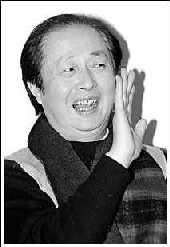Zhao Jiping was born in 1945 and graduated from theXi'anMusic Conservatory in 1970 inShaanxi Province. He worked in a local opera institute until 1978 when he began to study composition at theCentral Conservatory of Music.
 It is said that Zhao had a wide range of interests in musical taste and absorption, which enables him to break established Chinese musical ideologies. As a result, his compositions are known to be very creative and free. According to Zhao, this has something to do with the place where he grew up: "Xi'an is like a lock along theSilk Roadthat links the Chinese civilization and the way to Europe," he said. On one hand, Zhao has always been submerged in traditional Chinese folk music; on the other, he began to study and enjoy western music since his childhood. Zhao has built up the Music Silk Road in his mind, incorporating traditional connotations and advanced musical language. His works emit a strong flavor of folk music, but are also characterized by modern techniques and perceptions.
It is said that Zhao had a wide range of interests in musical taste and absorption, which enables him to break established Chinese musical ideologies. As a result, his compositions are known to be very creative and free. According to Zhao, this has something to do with the place where he grew up: "Xi'an is like a lock along theSilk Roadthat links the Chinese civilization and the way to Europe," he said. On one hand, Zhao has always been submerged in traditional Chinese folk music; on the other, he began to study and enjoy western music since his childhood. Zhao has built up the Music Silk Road in his mind, incorporating traditional connotations and advanced musical language. His works emit a strong flavor of folk music, but are also characterized by modern techniques and perceptions.
Zhao noted that Chinese film scores are now in a flourishing age, with very diversified styles. A Chinese composer should not only study traditional Chinese music, but also western music, Zhao advises, and, in turn, integrate the two to create music that embodies Chinese philosophy, its notions and feelings.
Zhao has been engaged in the music industry for about 20 years, with more than 60 works under his belt. Some of the most renowned works include the score for "Red Sorghum", "Farewell, My Concubine", "Ju Dou", "Yellow Earth", "The Story of Qiu Ju", "The Emperor and the Assassin" and "Breaking the Silence" -- all of which have enjoyed great international prestige. According to Zhao's old partner, directorZhang Yimou: "Zhao represents Chinese movie music during the 1980s and 1990s. In fact, he is a milestone and a great master."
